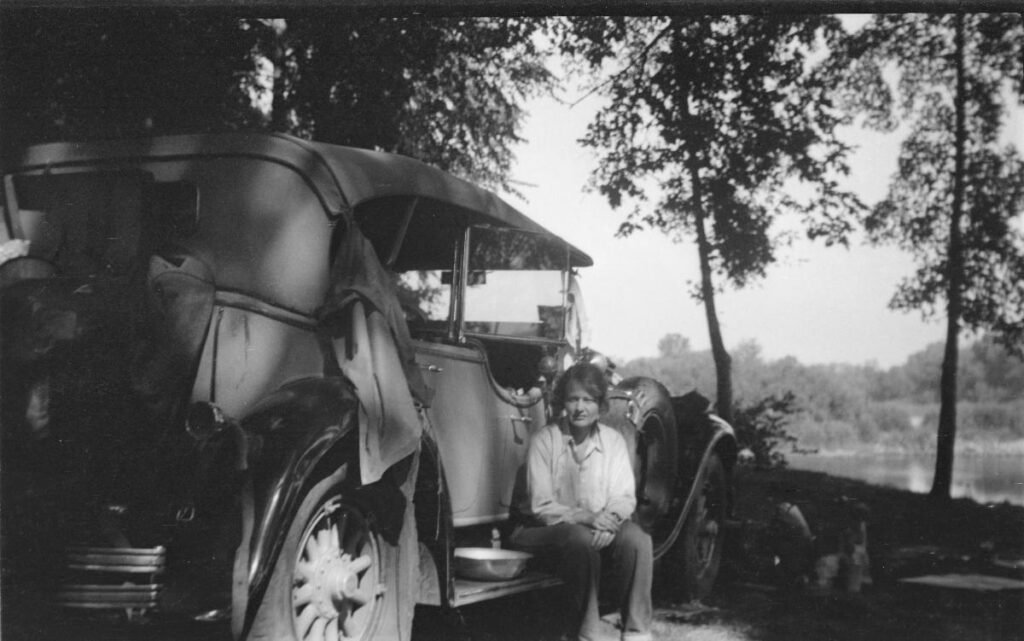
May 29, 2020
Elizabeth Patterson: A Life in Discipleship
Baba’s sister Mani once shared that Elizabeth’s nickname among the Eastern women Mandali was ‘Yes Baba dear.’ This was because whatever Baba asked of her, she instantly replied, “Yes Baba dear.” Elizabeth was the founder of the Meher Center along with Norina Matchabelli, charged with the responsibility of finding the Center and then developing what would become Baba’s home in the West. But just as Elizabeth’s epitaph says, “Elizabeth, disciple of Meher Baba,” she was first and foremost an exemplary disciple, one who has shown us by her life with Baba and in her legacy at the Meher Center that at every step, all our lives with Baba are flower beds to sow the seeds of His pleasure.
Everyone who knew Elizabeth uses similar words to describe her: practical, poised, imperturbable and steadfast. In fact, Baba called her, “My rock.” It must take no less than being a rock to come to be a woman of her magnitude. In running the Center, Baba had remarked, “Whatever Elizabeth decides is what I want for My Center.” In that He bestowed on her a responsibility that she took on with humility and poise but completely bereft of any assumed spiritual authority.
Elizabeth’s poise, among many things, was a result of her complete faith in Baba. Her commanding presence stemmed from her absolute trust in Baba, followed by confident action. When asked how she knew what Baba wanted her to do each day, she replied, “Every morning I take a few moments to listen in silence for Baba’s guidance. Now he doesn’t answer in so many words. But when I listen each morning, the day becomes the answer.”
Another exceptional quality that she exhibited, especially in running the Center, was her inimitable and meticulous attention to detail. Very much like others in Baba’s Mandali, attention to little things was a discipline that Baba instilled in His close ones. Wendy Haynes Connor recalls one of the first times that she witnessed Elizabeth’s famous sixth sense when it came to the Center. One day Elizabeth called Wendy to bring the car. Elizabeth had to stop driving towards the end because of her failing eyesight and by this time she was hunched over from age and injury, and moved very slowly. When Wendy arrived, she saw Elizabeth struggling with a large pink tray covered with an odd assortment of things. She guided Wendy first to the Lantern cabin. “Do you see any matches?” She asked. “No,” replied Wendy. Then she asked, “Do you see a potholder?” “No.” “A lid?” Elizabeth happened to have a lid that fit a teapot perfectly. Then she kneeled down awkwardly to paint a part of the toilet seat where the enamel had worn off. Their work at the Lantern was done.
Next, they went to Cedar Nook. Somehow Elizabeth knew that the toilet tissue roll was empty. “Now we need to put this roll behind the toilet. There must always be an extra toilet tissue for the guest.” Then, at another cabin, they cleaned a soap tray and put new soap in. They re-arranged cutlery drawers and set the table in preparation for guests to arrive that afternoon. And Elizabeth also had Wendy lie down on a bed. “Now sit up. Put your feet on the floor. Do you see the little carpet?” Wendy saw the carpet way off to the side. “That’s not going to keep your feet warm is it? Now move the carpet to where a guest’s feet would most likely land when they get up.”
How can one sum up such a life? But if one were to try, an anecdote from Charles Haynes’ book* about Elizabeth comes to mind. She remarked once, “You know Baba doesn’t want us to stand on the threshold, when we did He would gesture, ‘come in or go out – but do not stand on the threshold.’ So why don’t you come in?” And that was Elizabeth, the definition of a disciple who wholeheartedly dove into life with Meher Baba and never looked back.
* The Day Becomes the Answer, Charles Haynes, Pg. 9